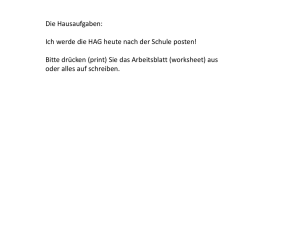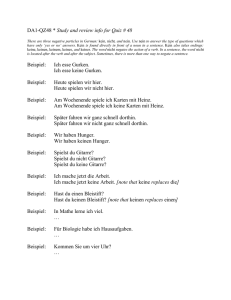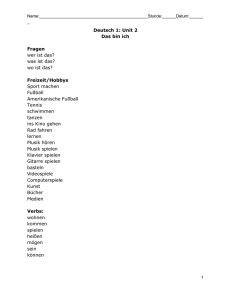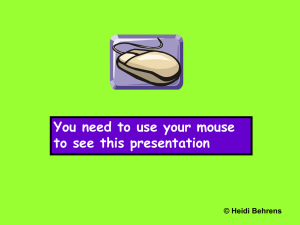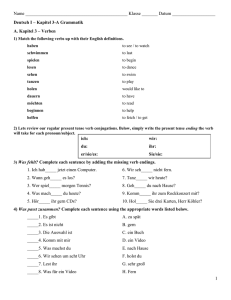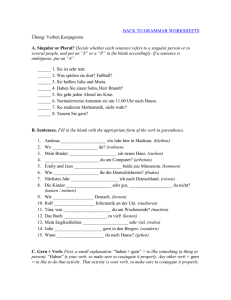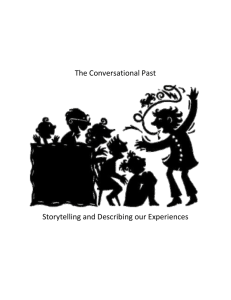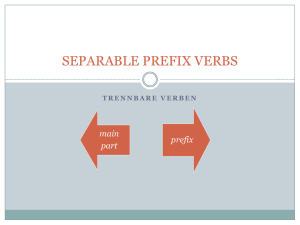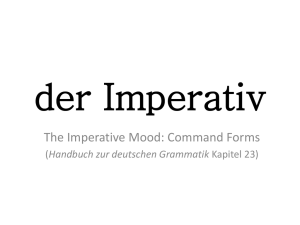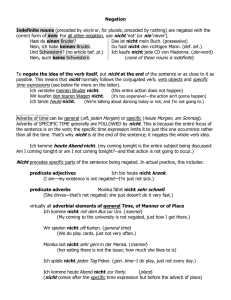Improve your writing
Werbung
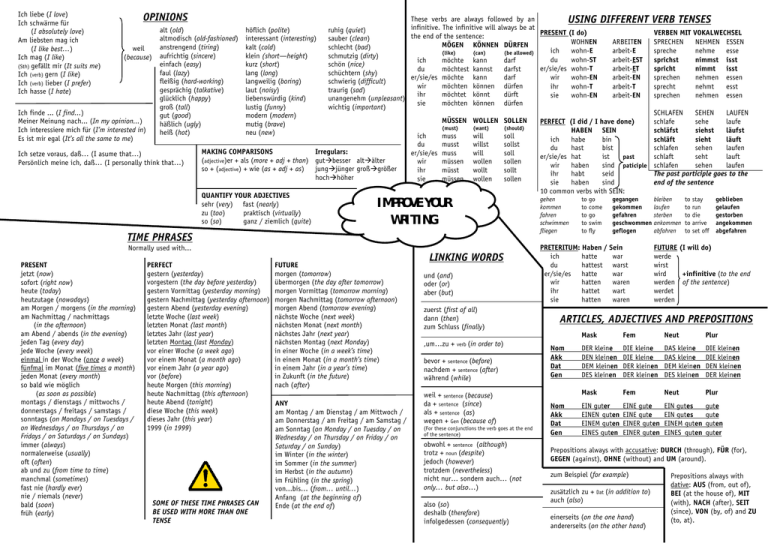
Ich liebe (I love) Ich schwärme für (I absolutely love) Am liebsten mag ich (I like best…) Ich mag (I like) (Sth) gefällt mir (It suits me) Ich (verb) gern (I like) Ich (verb) lieber (I prefer) Ich hasse (I hate) OPINIONS weil (because) Ich finde ... (I find...) Meiner Meinung nach... (In my opinion...) Ich interessiere mich für (I’m interested in) Es ist mir egal (It’s all the same to me) alt (old) altmodisch (old-fashioned) anstrengend (tiring) aufrichtig (sincere) einfach (easy) faul (lazy) fleißig (hard-working) gesprächig (talkative) glücklich (happy) groß (tall) gut (good) häßlich (ugly) heiß (hot) Ich setze voraus, daß… (I asume that…) Persönlich meine ich, daß… (I personally think that…) höflich (polite) interessant (interesting) kalt (cold) klein (short—height) kurz (short) lang (long) langweilig (boring) laut (noisy) liebenswürdig (kind) lustig (funny) modern (modern) mutig (brave) neu (new) These verbs are always followed by an USING infinitive. The infinitive will always be at ruhig (quiet) PRESENT (I do) the end of the sentence: sauber (clean) WOHNEN MÖGEN KÖNNEN DÜRFEN schlecht (bad) ich wohn-E (like) (can) (be allowed) schmutzig (dirty) du wohn-ST ich möchte kann darf schön (nice) er/sie/es wohn-T du möchtest kannst darfst schüchtern (shy) er/sie/es möchte kann darf wir wohn-EN schwierig (difficult) wir möchten können dürfen ihr wohn-T traurig (sad) ihr möchtet könnt dürft sie wohn-EN unangenehm (unpleasant) sie möchten können dürfen wichtig (important) MÜSSEN WOLLEN SOLLEN MAKING COMPARISONS Irregulars: (adjective)er + als (more + adj + than) gut besser alt älter so + (adjective) + wie (as + adj + as) jung jünger groß größer hoch höher QUANTIFY YOUR ADJECTIVES sehr (very) fast (nearly) zu (too) praktisch (virtually) so (so) ganz / ziemlich (quite) ich du er/sie/es wir ihr sie (must) (want) (should) muss musst muss müssen müsst müssen will willst will wollen wollt wollen soll sollst soll sollen sollt sollen IMPROVE YOUR WRITING TIME PHRASES Normally used with... PRESENT jetzt (now) sofort (right now) heute (today) heutzutage (nowadays) am Morgen / morgens (in the morning) am Nachmittag / nachmittags (in the afternoon) am Abend / abends (in the evening) jeden Tag (every day) jede Woche (every week) einmal in der Woche (once a week) fünfmal im Monat (five times a month) jeden Monat (every month) so bald wie möglich (as soon as possible) montags / dienstags / mittwochs / donnerstags / freitags / samstags / sonntags (on Mondays / on Tuesdays / on Wednesdays / on Thursdays / on Fridays / on Saturdays / on Sundays) immer (always) normalerweise (usually) oft (often) ab und zu (from time to time) manchmal (sometimes) fast nie (hardly ever) nie / niemals (never) bald (soon) früh (early) PERFECT gestern (yesterday) vorgestern (the day before yesterday) gestern Vormittag (yesterday morning) gestern Nachmittag (yesterday afternoon) gestern Abend (yesterday evening) letzte Woche (last week) letzten Monat (last month) letztes Jahr (last year) letzten Montag (last Monday) vor einer Woche (a week ago) vor einem Monat (a month ago) vor einem Jahr (a year ago) vor (before) heute Morgen (this morning) heute Nachmittag (this afternoon) heute Abend (tonight) diese Woche (this week) dieses Jahr (this year) 1999 (in 1999) SOME OF THESE TIME PHRASES CAN BE USED WITH MORE THAN ONE TENSE FUTURE morgen (tomorrow) übermorgen (the day after tomorrow) morgen Vormittag (tomorrow morning) morgen Nachmittag (tomorrow afternoon) morgen Abend (tomorrow evening) nächste Woche (next week) nächsten Monat (next month) nächstes Jahr (next year) nächsten Montag (next Monday) in einer Woche (in a week’s time) in einem Monat (in a month’s time) in einem Jahr (in a year’s time) in Zukunft (in the future) nach (after) ANY am Montag / am Dienstag / am Mittwoch / am Donnerstag / am Freitag / am Samstag / am Sonntag (on Monday / on Tuesday / on Wednesday / on Thursday / on Friday / on Saturday / on Sunday) im Winter (in the winter) im Sommer (in the summer) im Herbst (in the autumn) im Frühling (in the spring) von...bis… (from… until…) Anfang (at the beginning of) Ende (at the end of) LINKING WORDS und (and) oder (or) aber (but) zuerst (first of all) dann (then) zum Schluss (finally) ,um…zu + verb (in order to) bevor + sentence (before) nachdem + sentence (after) während (while) weil + sentence (because) da + sentence (since) als + sentence (as) wegen + Gen (because of) (For these conjunctions the verb goes at the end of the sentence) obwohl + sentence (although) trotz + noun (despite) jedoch (however) trotzdem (nevertheless) nicht nur… sondern auch… (not only… but also…) also (so) deshalb (therefore) infolgedessen (consequently) DIFFERENT VERB TENSES ARBEITEN arbeit-E arbeit-EST arbeit-ET arbeit-EN arbeit-T arbeit-EN PERFECT (I did / I have done) HABEN SEIN ich habe bin du hast bist past er/sie/es hat ist wir haben sind paticiple ihr habt seid sie haben sind 10 common verbs with SEIN: gehen kommen fahren schwimmen fliegen to go to come to go to swim to fly gegangen gekommen gefahren geschwommen geflogen PRETERITUM: Haben / Sein ich hatte war du hattest warst er/sie/es hatte war wir hatten waren ihr hattet wart sie hatten waren VERBEN MIT SPRECHEN spreche sprichst spricht sprechen sprecht sprechen VOKALWECHSEL NEHMEN ESSEN nehme esse nimmst isst nimmt isst nehmen essen nehmt esst nehmen essen SCHLAFEN SEHEN LAUFEN schlafe sehe laufe schläfst siehst läufst schläft sieht läuft schlafen sehen laufen schlaft seht lauft schlafen sehen laufen The past participle goes to the end of the sentence bleiben laufen sterben ankommen abfahren to stay to run to die to arrive to set off geblieben gelaufen gestorben angekommen abgefahren FUTURE (I will do) werde wirst wird +infinitive (to the end werden of the sentence) werdet werden ARTICLES, ADJECTIVES AND PREPOSITIONS Nom Akk Dat Gen Nom Akk Dat Gen Mask Fem Neut Plur DER kleine DEN kleinen DEM kleinen DES kleinen DIE kleine DIE kleine DER kleinen DER kleinen DAS kleine DAS kleine DEM kleinen DES kleinen DIE kleinen DIE kleinen DEN kleinen DER kleinen Mask Fem Neut Plur EIN guter EINEN guten EINEM guten EINES guten EINE gute EINE gute EINER guten EINER guten EIN gutes EIN gutes EINEM guten EINES guten gute gute guten guter Prepositions always with accusative: DURCH (through), FÜR (for), GEGEN (against), OHNE (without) and UM (around). zum Beispiel (for example) zusätzlich zu + Dat (in addition to) auch (also) einerseits (on the one hand) andererseits (on the other hand) Prepositions always with dative: AUS (from, out of), BEI (at the house of), MIT (with), NACH (after), SEIT (since), VON (by, of) and ZU (to, at).
